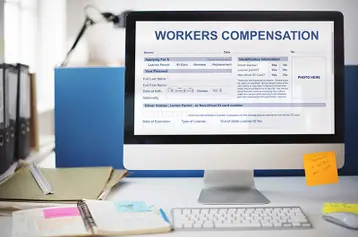
Among the many daily priorities you have for your business, the safety and well-being of your employees should be at the top of your list. A work-related injury may negatively affect the employee and could adversely affect the profitability of your business. From repairing the fallout to your company’s reputation to seeing a loss of profit due to reduced productivity, workplace accidents can create many challenges for a business owner.
What is workers’ compensation?
Workers’ compensation is a type of insurance, purchased by an employer, to cover a portion of lost wages and related medical expenses arising from work-related accidents. This insurance also provides some security for employers by providing benefits regardless of who is at fault. Thus, generally, the employee cannot sue their employer for the injuries covered.
Offering workers’ compensation
As an employer, you are responsible for protecting your employees from work-related hazards but it’s equally important that employees invest in their own safety. Even in low-risk work environments, an injury can occur. Workers’ compensation is a great way to protect both you and your employees.
While the requirements for providing workers’ compensation vary greatly depending on where your business operate[s], by offering workers’ compensation insurance, you are showing your employees that you care about their safety and, as a result, you may have a more motivated and dedicated team of employees.
Whether you are an employer or employee, be sure you have the right type of insurance coverage in case of accident, injury or illness. For employers, you’ll want to utilize a workers’ compensation specialist who can help you understand what type of insurance is required for your company and make sure you are compliant.
Making workers’ compensation part of safety training
The best time to explain workers’ compensation to your employees is during the hiring process. This information should also be reiterated during regular and ongoing safety training sessions, or if you make changes to your workplace safety plan. Simply posting a “what to do if you’re injured in an accident” poster in the breakroom is not enough. You need to communicate your workplace safety policies and make sure employees understand penalties (such as formal write-ups) for disregarding these policies.
Requiring each employee to read and possess a workplace safety handbook (and having them sign that they read and understand your company’s safety policies) is a great first step.
When discussing workplace safety, reiterate to your employees:
-
The company’s policy on safety.
-
Tools and resources provided to make sure everyone is operating in a safe and healthy manner (i.e. helmets, first aid stations, ergonomic chairs and rules about wearing closed-toed shoes).
-
The need for your employees to immediately report the accident or injury to you, the employer, so that you can file a claim right away. From there, your business will have to act quickly to manage the workers’ compensation claim.
While most industries require some amount of workers’ compensation insurance, farm workers, domestic workers and seasonal employees are usually excluded from coverage. It’s important that your employees know what to do if your workers’ compensation doesn’t cover them.
All employers need to be up-to-date on safety equipment and make sure their employees are well-versed in workplace safety. Additionally, if you live in a state where short-term disability programs exist, make sure your employees are aware of what paperwork they need to fill out if they are injured on the job.
This communication is for informational purposes only; it is not legal, tax or accounting advice; and is not an offer to sell, buy or procure insurance.
This post may contain hyperlinks to websites operated by parties other than TriNet. Such hyperlinks are provided for reference only. TriNet does not control such websites and is not responsible for their content. Inclusion of such hyperlinks on TriNet.com does not necessarily imply any endorsement of the material on such websites or association with their operators.
The opinions and views expressed by guest authors of the TriNet blog are their own and do not necessarily reflect those of TriNet or any of its affiliates or partners.






